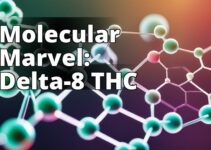What readers will learn from this article:
- The chemical composition and properties of delta-9 THC
- The short-term and long-term risks of consuming delta-9 THC
- Strategies for responsible use and harm reduction
What are the potential risks of consuming delta-9 THC? As the popularity of cannabis and hemp products continues to rise, it is crucial to have a comprehensive understanding of the potential dangers associated with their consumption. Delta-9 THC (tetrahydrocannabinol) is one of the primary compounds found in these plants. While it can induce altered perception and relaxation, it can also lead to anxiety, dry mouth, and memory loss. This article aims to shed light on the potential risks of delta-9 THC and provide strategies for mitigating those risks.
Understanding Delta-9 THC
Delta-9 THC is a psychoactive compound found in cannabis and hemp plants. It belongs to a class of compounds called cannabinoids, which interact with the body's endocannabinoid system. When consumed, delta-9 THC binds to cannabinoid receptors in the brain and central nervous system, resulting in its psychoactive effects.
Research has shown that delta-9 THC has therapeutic potential. It has been found to be effective in treating conditions such as nausea, appetite promotion, pain, and multiple sclerosis symptoms. However, it is important to note that delta-9 THC can also impair cognitive function and induce unpleasant psychological reactions.
The World Health Organization (WHO) has recommended rescheduling delta-9 THC to a lower risk category due to its low abuse potential and minimal risk to public health. However, the long-term effects of delta-9 THC are still relatively unknown due to limited studies.
Short-Term Effects of Delta-9 THC
When delta-9 THC is consumed, it produces immediate effects on the body and mind. The intensity of these effects can vary depending on the dosage, individual tolerance, and method of consumption. Some common short-term effects of delta-9 THC include altered perception, impaired cognition, and difficulties with motor coordination.
Altered perception is a hallmark effect of delta-9 THC. It can lead to changes in sensory perception, such as heightened senses or altered time perception. While these effects may be enjoyable for some individuals, they can also be disorienting or unsettling for others.
Impaired cognition is another potential short-term effect of delta-9 THC. It can affect attention span, memory, and decision-making abilities. This impairment can be particularly concerning when it comes to tasks that require focus or quick thinking, such as driving or operating machinery.
Difficulties with motor coordination are also commonly observed with delta-9 THC consumption. It can cause clumsiness, unsteady movements, and impaired hand-eye coordination. These effects can increase the risk of accidents or injuries, especially in situations that require precise motor skills.
Psychological Reactions
In addition to the immediate effects on perception and cognition, delta-9 THC can also induce various psychological reactions. While some individuals may experience positive effects such as relaxation or euphoria, others may be more susceptible to negative reactions.
Anxiety and paranoia are potential psychological reactions that can occur with delta-9 THC consumption. Some individuals may experience increased levels of anxiety or even panic attacks. These effects are more likely to occur in individuals who are already prone to anxiety or have a history of panic disorders.
Hallucinations, both visual and auditory, can also be induced by delta-9 THC. These hallucinations can range from mild distortions in perception to more intense and vivid experiences. It is important to note that these hallucinations are different from those associated with certain hallucinogenic substances, such as LSD or psilocybin mushrooms.
Individual susceptibility to these psychological reactions can vary greatly. Factors such as dosage, set and setting, and personal mental health history can influence the intensity and nature of these reactions. It is always recommended to start with low doses and be in a comfortable and safe environment when consuming delta-9 THC.
Addiction Potential
Delta-9 THC, like other forms of THC, has addictive potential. Regular consumption of delta-9 THC can lead to dependence, where the body develops a tolerance to the compound, requiring higher doses to achieve the desired effects. When consumption is abruptly stopped, individuals may experience withdrawal symptoms, such as irritability, insomnia, and decreased appetite.
Recognizing the signs of addiction is crucial for providing the necessary help and support. Some common signs of delta-9 THC addiction include an increasing tolerance for the compound, a strong desire to consume it, unsuccessful attempts to cut down or quit, and continued use despite negative consequences. It is important to seek professional help if addiction is suspected.
Recovery from delta-9 THC addiction is possible with counseling, support groups, and treatment programs. It is important to approach addiction with compassion and understanding, as it is a complex issue that requires individualized care.
Impact on Mental Health
While delta-9 THC can provide temporary relief from certain mental health symptoms, it is important to consider its potential impact on mental health in the long run. For individuals with pre-existing mental health conditions, delta-9 THC consumption may exacerbate symptoms or interfere with ongoing treatment.
Delta-9 THC has been associated with increased anxiety and paranoia, especially at higher doses or in susceptible individuals. It can also trigger or worsen symptoms of depression. Individuals with a history of mental health disorders should carefully consider the potential risks before consuming delta-9 THC.
It is important to emphasize that everyone's experience with delta-9 THC is unique, and some individuals may find that it provides them with relief or relaxation. However, it is crucial to approach its use with caution and be aware of the potential risks to mental health.
Physical Side Effects
In addition to its psychological effects, delta-9 THC can also cause various physical side effects. These side effects can include dry mouth, red eyes, increased heart rate, and coordination difficulties.
Dry mouth, also known as “cottonmouth,” is a common side effect of delta-9 THC consumption. It occurs due to the compound's interaction with the salivary glands, reducing saliva production. Drinking plenty of water can help alleviate this discomfort.
Red eyes are another common side effect of delta-9 THC. It happens due to the compound's ability to dilate blood vessels, including those in the eyes. Eye drops can help reduce redness and dryness.
Increased heart rate is a potential side effect that can occur shortly after consuming delta-9 THC. It is important to note that this effect is temporary and usually subsides as the compound is metabolized by the body. Individuals with pre-existing heart conditions should exercise caution when consuming delta-9 THC.
Coordination difficulties are also commonly observed with delta-9 THC consumption. It can affect fine motor skills and overall coordination, leading to clumsiness or unsteady movements. Engaging in activities that require precise coordination, such as driving, should be avoided while under the influence of delta-9 THC.
| Potential Risks and Side Effects of Delta-9 THC Consumption | Short-Term Effects | Psychological Reactions | Addiction Potential | Impact on Mental Health | Physical Side Effects | Long-Term Risks and Health Consequences |
|---|---|---|---|---|---|---|
| Altered perception | Yes | No | No | No | No | No |
| Impaired cognition | Yes | No | No | No | No | No |
| Difficulties with motor coordination | Yes | No | No | No | Yes | No |
| Anxiety and paranoia | No | Yes | No | Yes | No | No |
| Hallucinations | No | Yes | No | No | No | No |
| Addiction and dependence | No | No | Yes | No | No | No |
| Exacerbation of mental health conditions | No | No | No | Yes | No | No |
| Dry mouth | No | No | No | No | Yes | No |
| Red eyes | No | No | No | No | Yes | No |
| Increased heart rate | No | No | No | No | Yes | Yes |
| Coordination difficulties | No | No | No | No | Yes | No |
| Organ damage | No | No | No | No | No | Yes |
| Cardiovascular effects | No | No | No | No | No | Yes |
Long-Term Risks and Health Consequences
While the short-term effects of delta-9 THC are relatively well-studied, the long-term risks and health consequences are still not fully understood due to limited research. However, some concerns have been raised regarding the potential impact of long-term delta-9 THC consumption on various aspects of health.
One of the primary concerns is the potential for organ damage, particularly in the respiratory system. Smoking cannabis or inhaling delta-9 THC can expose the lungs to various harmful compounds, similar to tobacco smoke. Prolonged exposure may increase the risk of respiratory issues such as chronic bronchitis or lung cancer.
Another concern is the potential cardiovascular effects of delta-9 THC. While acute consumption can temporarily increase heart rate, it is unclear whether long-term use may contribute to cardiovascular problems such as hypertension or heart disease.
Further research is needed to fully understand the long-term risks and health consequences of delta-9 THC consumption. In the meantime, it is important to approach its use with caution and consider alternative consumption methods such as edibles or vaporization to minimize potential harm.
Case Study: The Importance of Seeking Professional Guidance
XII. Case Study: The Importance of Seeking Professional Guidance
Meet Sarah, a 25-year-old college student who recently moved to a state where cannabis is legal. Curious about the potential therapeutic benefits, Sarah decided to try delta-9 THC for the first time. Excited but also cautious, she wanted to ensure a safe and responsible experience.
Before experimenting, Sarah reached out to a local cannabis dispensary to seek professional guidance. She spoke with a knowledgeable staff member who provided her with detailed information about delta-9 THC, its effects, and potential risks. The staff member helped Sarah understand the importance of starting with a low dosage, taking into account her individual tolerance and sensitivity.
Following the staff member's advice, Sarah began her journey with delta-9 THC by trying a low-dose edible. She carefully monitored her physical and psychological reactions, paying attention to any signs of discomfort or adverse effects. Throughout the experience, Sarah felt empowered by her decision to seek professional guidance, knowing that she had taken steps to minimize potential harm.
Sarah's experience highlights the significance of seeking professional advice when exploring delta-9 THC. By consulting with knowledgeable individuals, she was able to make informed choices, ensuring a safer and more responsible use of the substance. Sarah's case reminds us that seeking professional guidance is an essential component of harm reduction strategies when it comes to delta-9 THC.
In conclusion, Sarah's case study exemplifies the importance of seeking professional guidance when navigating the world of delta-9 THC. By doing so, individuals can gain valuable insights, make informed decisions, and prioritize their safety. Whether it's consulting with cannabis experts at dispensaries or seeking advice from healthcare professionals, reaching out for guidance can contribute to a more positive and responsible experience with delta-9 THC.
Risk Mitigation Strategies
To mitigate the potential risks of delta-9 THC consumption, it is important to follow these strategies:
- Start with low doses: Begin with a low dose to gauge your individual tolerance and response to delta-9 THC.
- Choose a safe environment: Consume delta-9 THC in a comfortable and safe environment to minimize the risk of negative psychological reactions.
- Avoid mixing substances: Do not combine delta-9 THC with other substances, such as alcohol or prescription medications, as it may increase the risk of adverse effects.
- Practice moderation: Use delta-9 THC in moderation and avoid excessive or frequent consumption to reduce the likelihood of dependence or addiction.
- Consider alternative consumption methods: Explore alternative methods of consuming delta-9 THC, such as edibles or vaporization, to minimize potential harm to the respiratory system.
- Seek professional help when needed: If you suspect addiction or experience persistent negative effects, seek professional help from healthcare providers or addiction specialists.
By implementing these risk mitigation strategies, individuals can make informed decisions about delta-9 THC consumption and minimize potential harm to their physical and mental well-being.
Conclusion
As the popularity of delta-9 THC continues to rise, it is crucial to have a comprehensive understanding of its potential risks and effects. While delta-9 THC can provide therapeutic benefits, it also carries the risk of negative psychological reactions, addiction, and physical side effects. By being aware of these risks and implementing risk mitigation strategies, individuals can make informed choices and minimize potential harm. It is important to approach delta-9 THC consumption with caution and seek professional help when needed.
Dr. Samuel Collins, a renowned psychiatrist and addiction specialist, is the author of this informative article on Delta-9 THC. With over 20 years of experience in the field, Dr. Collins has dedicated his career to studying the effects of psychoactive substances on mental health and well-being.
Having earned his medical degree from a prestigious university, Dr. Collins went on to complete his residency in psychiatry, followed by a fellowship in addiction medicine. During his extensive career, he has worked closely with individuals struggling with substance abuse and addiction, witnessing firsthand the detrimental impact that Delta-9 THC can have on their lives.
Dr. Collins's expertise extends beyond clinical practice. He has conducted numerous research studies on the effects of Delta-9 THC, collaborating with other experts in the field to advance our understanding of its hidden dangers. His work has been published in reputable medical journals, and he has presented his findings at international conferences.
As an advocate for evidence-based treatment approaches, Dr. Collins emphasizes the importance of seeking professional guidance when dealing with Delta-9 THC use. In this article, he provides invaluable insights and risk mitigation strategies to help readers navigate the potential dangers associated with this psychoactive compound.




